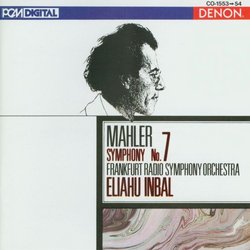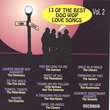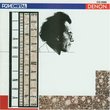| All Artists: Gustav Mahler, Eliahu Inbal, Frankfurt Radio Symphony Hall, Frankfurt Radio Symphony Orchestra Title: Mahler: Symphony 7 Members Wishing: 0 Total Copies: 0 Label: Denon Records Release Date: 8/25/1993 Genre: Classical Style: Symphonies Number of Discs: 2 SwapaCD Credits: 2 UPC: 081757155328 |
Search - Gustav Mahler, Eliahu Inbal, Frankfurt Radio Symphony Hall :: Mahler: Symphony 7
 | Gustav Mahler, Eliahu Inbal, Frankfurt Radio Symphony Hall Mahler: Symphony 7 Genre: Classical
|
Larger Image |
CD DetailsSimilar CDs
|
CD ReviewsMahler's problem child redeemed Paul Bubny | Maplewood, NJ United States | 06/01/2002 (5 out of 5 stars) "As a diehard Mahlerite, I have to say I thought I knew the Seventh fairly well, but Inbal manages to make this familiar (to me) work seem utterly new and strange while holding it firmly together (which too often isn't the case in performances of this problem-child of the Mahler family). And he does this without seeming to impose his personality on the music. This is the only Seventh on disc I know of that can match the Bernstein versions (Sony and DG). And it's better-recorded than either of them. Hey Denon--when are you going to reissue all of Inbal's Mahler recordings in a boxed set, as DG did for Bernstein? This is a missed opportunity." The crown of Inbal's Mahler cycle Ytzan | Athens, GR | 04/15/2001 (5 out of 5 stars) "This is a really great interpretation. I have Rattle's account with the CBSO for EMI and Bernstein's account on Sony but I find this one better than both. The 7th is probably the most problematic of all Mahler symphonies but Inbal manages to keep it together. Excellent playing as always from the Frankfurt orchestra." Eerie conundrum taken at face value Pater Ecstaticus | Norway | 09/19/2005 (5 out of 5 stars) "So there you have it. Undeniable conundrum and enigma: Mahler's Seventh Symphony. No one really knows what to say about its real meaning in the end. What the gods is Mahler trying to tell us here?! What you think is the 'real' meaning of this music is mostly up to your own f e e l i n g s about which interpretation is the 'right' one. Especially with the finale, this question of interpretation has traditionally gone two ways: either it is seen as a return to the light of day from a nightmarish 'deep night of the soul', or it is just a perversion of just that idea: there is no 'salvation', no 'return from the nightmare', it is all one meaningless joke. Or it is both. Or it is NEITHER. Anyway, every and any interpretation of this music can only be a purely poetic one. Or maybe this symphony is 'just' a (very elaborate) experiment of 'absolute music' by Mahler in the upcoming neo-classical style. At least one brilliant composer was amazed by this new music: Arnold Schoenberg realised its out-of-place position within Mahler's oeuvre, but mainly because he himself at that very time was also turning away from the romantic view of music and using the same kind of 'objective' techniques in writing music that Mahler was doing in his Seventh Symphony (mainly the procedure of superimposed fourths). But where Schoenberg would go on and develop further into the direction he had gone into with his own new, objective music, Mahler's Seventh Symphony would stay 'just' an experiment in the neo-classical, objective style: in his Eighth Symphony Mahler would return fully - and confidently - to the romantic self-searching that was his natural home. (Deryck Cooke)
Nevertheless, this music remains enigmatic, and it should then just be taken at face value, without trying to find any 'deeper' or 'hidden' meanings, at least where the conductor is concerned. Inbal's interpretation is one of pure, natural beauty. He lets the music blossom fully, and where this music may be 'pure music' and 'neo-classical' in conception, it should nonetheless be breathing and full as a world on its own. Inbal injects this world with power, breadth, life-force and colour in a finely detailed, clear and full recording which, together with Bernard Haitink's even more excellent 1982 recording, I very much enjoy as more 'relaxed' performances of this lovely enigmatic symphony. But when one expects the ambivalence and schizophrenia of this music to be more overtly prominent on display, one should go to the magnificently energetic recording by the City of Birmingham Symphony Orchestra conducted by Sir Simon Rattle. And last but not least, for sheer beauty of playing and stylish conducting (combined with lavishly recorded sound) I recommend Michael Tilson Thomas in his great Mahler cycle with the San Francisco Symphony Orchestra (maybe the best, this one)." |

 Track Listings (2) - Disc #1
Track Listings (2) - Disc #1


